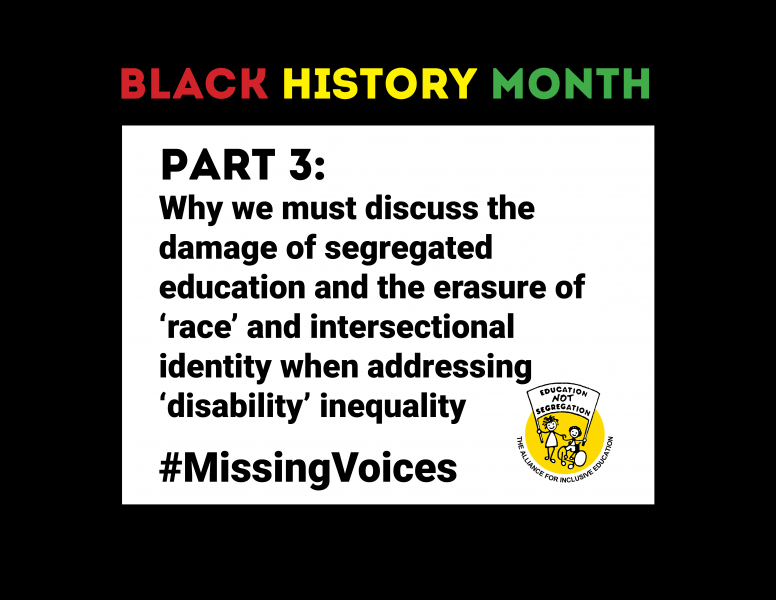Why we must discuss the damage of segregated education and the erasure of ‘race’ and intersectional identity when addressing ‘disability’ inequality
Part 3 of our ‘Missing Voices’. By Michelle Daley, ALLFIE Director.

Why we must discuss the damage of segregated education and the erasure of ‘race’ and intersectional identity when addressing ‘disability’ inequality
By Michelle Daley
We know that segregation is the main mechanism by which children and young people are actively separated by characteristics such as: class, gender, religion, impairment, etc. I have always believed that segregated schools, college and other alternative provisions are the most damaging pathways in maintaining and perpetuating inequalities and injustice. For example, segregated schools and colleges create an environment which encourages cultural myths and reinforces stereotypes about Disabled people. Our differences are presented as negative and often as tragic.
Segregated schooling also denies Disabled children the varied exposure and the opportunities provided through social development. I further argue that social development in most situations can be more important than the formal aspects of teaching and learning. This is because the informal elements can provide unspoken nuances that develop our own political identity. The denial of these experiences is further exaggerated for Disabled Black children and Young people of colour, because our experiences are often not recognised, valued, or understood.
On reflection, as a Disabled Black Woman my own schooling experience entailed being sent to a segregated school for children with physical impairments. This was called the ‘Elizabeth Fry School’ in the London Borough of Newham. At a very early age I learnt that the education system is systematically designed to exclude Disabled people. My schooling years were increasingly isolated. I was also frustrated and angry about the lack of recognition to different experiences, which I believe would have helped me to develop and embrace my identity.
I attended school during the 1970-80s and the profile of the staffing and pupils was predominately from a white racial background, a reflection of its time. I found the experiences of Disabled Black children and young people of colour were not understood from an intersectional perspective and these aspects of our identities were dismissed. When this topic was discussed, it was rooted in prejudice and inequality which I have no doubt impacted on my own day-to-day life. Sadly, these experiences of intersectional inequality based on race, disability, gender remain in today’s education system, as noted in recent Government reports (refer to Timpson Review on school exclusion and SEND review).
My younger self resented being sent to a segregated ‘special’ school. I recognised that I was being treated unfairly and felt that I had been rejected and abandoned. I continue to remain deeply disturbed by the legitimising of segregated schools for Disabled children that are masked under the auspices of ‘special’ or even ‘specialist’ education. I, like many others, are a living testament, a survivor of this deeply disturbing structural system that is institutionally unjust, a system we call ironically ‘education’.
My schooling experiences were also compounded with challenges and blatant discrimination. At that time, I found other pupils had shared experiences in discussions around issues of disability and gender inequality. However, I found myself alone when engaging in conversations about ‘race’ because staff and pupils were emotionally uncomfortable or could not relate.
My experiences have taught me that segregated schools create damaging consequences, unequal educational outcomes and have restricted any progress towards inclusion. This is particularly evident within education, because it endorses schools that are segregated and exposes children and communities to injustices. This ultimately encourages discrimination within societies.
This is why we must “educate, not segregate”.
![Allfie [logo]](https://www.allfie.org.uk/wp-content/themes/allfie-base-theme/assets/img/allfie-logo-original.svg)




Discussion
There is one comment.
Comment by Geoff Beacon
Good article but this prompts…
My clever, funny, engaging Aunt Annie was deaf. She was born in 1908 so perhaps times have changed.
She was born when the deaf were taught as aliens.
(But, in Margate, at least, with some dignity.)
Before they tried to suppress the signs
like the English suppressed Welsh.
Her social circle, apart from family, was mostly the Deaf Club.
I remember her and Uncle Tom as being happy people.
There are many more issues here and technology has opened other opportunities.
What is the current thinking for deaf children: To learn to sign and mix with people with whom it is easier to communicate or to discourage signing?